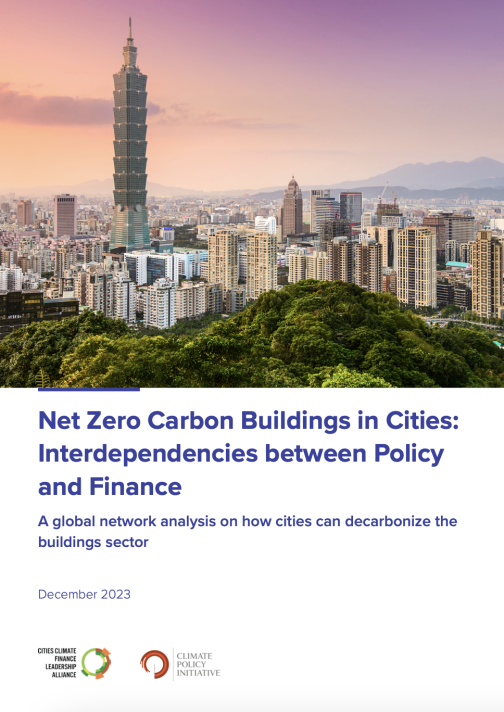
Net Zero Carbon Buildings in Cities: Interdependencies between Policy and Finance
This report offers findings on the challenges and mechanisms behind the transition towards a net zero carbon buildings sector, helping shed light on concrete pathways cities can implement to decarbonize the sector.
Buildings are central to an effective, resilient, and just net zero transition for cities. They are responsible for 37% of global energy-related greenhouse gas (GHG) emissions globally, the third highest sector after electricity and heat, and transport (UNEP, 2021; Ritchie et al., 2020). Buildings are also a critical component of cities’ resilience against the impacts of climate change, both in shared and private spaces, as a place of shelter and protection from extreme weather (C40 & McKinsey, 2021).
CCFLA believes city government actors and municipal authorities can and must respond to the opportunities to decarbonize the buildings sector. Their analysis explores how best they can consider their options in sequence across a range of responses, which we have framed as policy and finance instruments. While there is robust literature on policy options for decarbonizing buildings, the complex interdependencies between supporting instruments and implementation barriers remain unexplored. Understanding these relationships can enable city governments to select the most appropriate policy and financial tools to decarbonize their building sectors.
This report applies network analysis to examine the interdependencies between 75 policy and finance instruments, as well as 22 barriers, to support the transition to net zero carbon buildings. Such a network analysis approach allows us to move beyond case studies to explore potential high-impact pathways for cities to support a low-carbon transition for the building sector effectively.

Unlocking Subnational Finance for Green Sectorial Transformation: A Focus on Buildings & Cooling
Hosted during COP30 in Belém, Brazil, these dynamic panel discussions will explore strategies for enhancing access to transformative finance, and how these resources can support local climate transitions.

UNEA-7 Cities and Regions Summit
Hosted in the lead-up to UNEA-7, this Summit will unite subnational leaders to strengthen collaboration and amplify the importance of cities.

Sustainable Finance Action and Advocacy: A Roadmap for Global South Cities
This C40-led webinar, held alongside 4th International Conference on Financing for Development (FfD4), aimed to equip mayors with the tools they need to advocate for expanded and accelerated access to urban climate finance.

UrbanShift Looks Back: On the Value of Expanding Access to Urban Climate Finance
C40's Jessy Appavoo, ICLEI's André Almeida da Vila, and UNEP's Sharon Gil share why and how UrbanShift has prioritized support for cities to access climate finance.
